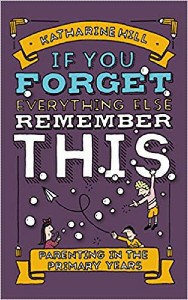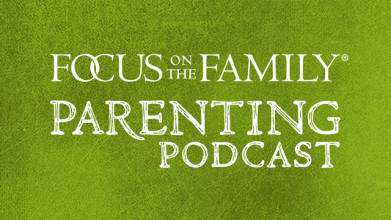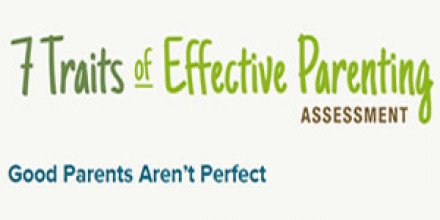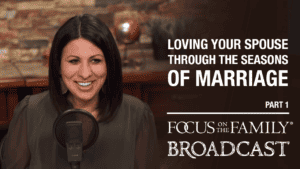
Engaging Hearts and Minds in a Broken Culture
This discussion offers a preview of Volume #16 “Cultures in Conflict” from the That The World May Know video series, available below.
Home » Episodes » Focus on the Family Broadcast » The Joys and Challenges of Parenthood (Part 1 of 2)
Woman #1: Um, the best parenting advice that I’ve been given is to give your child unconditional love.
Woman #2: One of the biggest pieces of advice I’ve heard for parents is just for them to read to their kids every night.
Woman #3: Don’t be afraid to give your kids responsibilities so that they can learn and grow.
John Fuller: Well, what do you think of that advice? Will that kind of a tip work in your family? Today on Focus on the Family, we’ll be examining the important relationship between moms, and dads, and children, and our goal is to help you become the best parent you can be. Thanks for joining us today. I’m John Fuller and your host is Focus president and author, Jim Daly.
Jim Daly: John, as a dad, I’ve really enjoyed every stage of parenting. Uh, the early years were tough because it’s so demanding, right? Both of our boys had colic, and so I was up at 2:00 in the morning driving them around the neighborhood, putting the boys on the dryer. Not in the dryer. (laughter)
John: To be fair, it was the… Yeah.
Jim: Just letting them feel that tumble.
John: Mm-hmm.
Jim: But it was exactly 12 weeks and it all mellowed out, but poor Jean, boy, she was so exhausted. And so that was tough, but it was still great. I remember Troy falling asleep on my chest-
John: Mm.
Jim: And just… Every night, he’d just lay there as I watched the news, and, uh, it was just something special for me. Um, what we need to recognize is that parenting is a marathon, not a sprint, and, um, boy, when I, um, meet couples with young kids, I remind them that the days are long but the years are short. Especially with both of our… All of our kids-
John: They’re all adults.
Jim: In their 20s and 30s now, and you just… You want to cherish these days ’cause they’re so special. Today, we want to focus on those early years and give you some best practices, uh, from our guest for raising your children. There’s so much panic in the culture in parenting right now, and so much fear. You know, they’re talking about, “It costs over $300,000 to raise a child.” You know, don’t let that interfere with the blessing of having children, ’cause I’ll tell you what, what’s gonna be on your tombstone is a, “Great wife and a wonderful mom.”
John: Mm.
Jim: It’s not gonna be all the accolades of academic achievement, it’s what happened in the family.
John: Yeah, and we have Katharine Hill here in the studio with us. She’s the UK Director for Care for the Family, a sister ministry to Focus on the Family, and, um, Katharine is a speaker and has written a number of books about family, and she’s married to Richard. They have four grown children and five grandchildren, and, uh, she’s written a book that we have here at the ministry, it’s called, If You Forget Everything Else, Remember This: Parenting in the Primary Years. You can learn more about that book when you call 800, the letter A, and the word FAMILY, or stop by the website, it’s focusonthefamily.com/broadcast.
Jim: Katharine, welcome back to Focus.
Katharine Hill: Thank you, Jim, so much.
Jim: So good to see you. Last time, uh, we were in Scotland, I think. We were there doing a men’s golf outing and, and we were able to interview you there.
Katharine: You were. I didn’t play golf, (laughter) but I came and chat to you. It was wonderful.
Jim: You are welcome to join, of course. But there, we talked about marriage, and great principles on keeping your marriage vibrant and alive, and today we’re covering parenting. So very much, Care for the Family is really, uh, in many ways, a mirrored organization to Focus. I’m trying to think back when Care for the Family started, was it about 30 years ago?
Katharine: 35.
Jim: 35.
Katharine: 35 years ago, yes.
Jim: So my, how the time has passed.
Katharine: Exactly.
Jim: And that was Lyndon Bowring, and, and, uh, Rob Parsons, and so many other friends there that got together, and we all pitched in and helped start that, so it’s been great to watch the growth of Care for the Family. Let’s get into it. Um, boy, you, you come with some great credentials in this area of being a professional and being a mother. Talk about that superhero myth that many, many parents, especially moms feel, uh, and why are we trying to be superheroes, and what are we trying to prove by doing that? There’s a bunch of questions.
Katharine: A lot of questions, but I do think the pressure on parents today is, is huge. Uh, so when I had our four, I had a, a, a big book… It was called the Good House Keeping Book of Child Care, and-
Jim: Sounds good.
Katharine: It was, but… And it told me what I needed to know, but for today’s parents, they’re bombarded with information, um, mainly on, you know, social media, but, you know, how to get your child to sleep, what to get them to eat, what they should be doing at what stage, and-
Jim: I could have used that book. (laughs)
Katharine: I think some of that was… Some of that pressure now, though, I think makes parents anxious, and if we’re not careful, we feel that we have to… We, we find our identity in being a successful parent, a successful mom, a successful dad at whatever, however we define success.
Jim: Yeah.
Katharine: And I know I slipped into that. I tell a story in the book. When I look back now, I am quite embarrassed, really, but I used to really love baking cakes. And it was our daughter’s fourth birthday, and I made this incredible cake. Um-
Jim: If you do say so yourself. (laughs)
Katharine: If I do say so myself, it was… It took me ages to do. It was, um… I don’t know if you have the Peter Rabbit series here-
Jim: Oh, yeah. Mm-hmm, yeah.
Katharine: By Beatrix Potter. So it was a Peter Rabbit Garden.
Jim: But this is from scratch, I would assume. Scratch cake.
Katharine: This was from scratch. (laughs) I can’t honestly.
Jim: Wow.
Katharine: And my husband and I, we were up late at night making little carrots, and a little scarecrow in the icing. It was a work of art. Wow.
Jim: Oh my goodness. What a great guy. (laughs)
Katharine: But honestly, what was I doing? Um, put it on the table, these kids wouldn’t have cared if I bought one from the supermarket. You know, a caterpillar one with a, a candle in. They didn’t care a bit. And in a moment of reflection afterwards, I thought, “Who was I trying to impress?” And probably the other moms, and I think so easily, parenting can become a bit of a, a competition if we’re not careful.
Jim: How do you… Uh, for the moms that are viewing and listening, how, how do you reel that back in? You had that revelation, what was the next party like? Just to carry that forward in your story, what did you do to dial that down and be comfortable with it?
Katharine: Yeah, not just in the parties but in every area of life.
Jim: Yeah.
Katharine: I think realizing that we don’t have anything to prove, we’ve got to get… This is the most important task, and we want to give it our best shot, but let’s not look sideways at what other people are making of our parenting, looking over our shoulder. It’s exhausting if we live like that, and it’s, it’s not keeping our focus on our children.
Jim: Right, and it kind of pushes into that next area I wanted to cover with you, which is guilt. And I… Honestly, so many women that we interview, moms, and wives, and women have a profound capacity to look at themselves first, but that also comes in with loading guilt on-
Katharine: Mm.
Jim: …that I didn’t do this right, or… I mean, men, I think our egos are too much that we go, “Oh, it’s not us, it’s the other guy.” Women are the exact… Generally, to me, are the exact opposite. It’s like they really look at themselves first and say, “Where did I fail?” How does that, that mom guilt build up? And I think you had… Not a funny story, but a dramatic story in London-
Katharine: Yeah.
Jim: Where the mom guilt really hit you. What happened?
Katharine: It certainly did. So, um, we had our four children, who were something like 2, 4, 6, and 8, and we also had one of my sister’s boys with us, and we’d managed to navigate London, uh, on the… You call it a Subway-
Jim: Yeah, tube.
Katharine: On the London Underground, and, uh, with all these children, and we’d been to some of the sites, and we’d got back to the station, and I was just patting myself on the back about what a great day out it had been, and how we’d managed really well. And then, our older two had an argument about getting into our car because this was a seat in the back that they didn’t want to sit in. You had to be faced backwards.
Jim: That’s that seat. (laughs)
Katharine: That’s that seat. They were having an argument and I said, “For goodness sake, if you can’t behave, you’ll have to walk home.” And we all got in the car, and off we drove to my sister’s house. So this is London. Um, it’s about 5:00 in the evening, so it’s going dark, and we drove probably about one and a half miles, and then George, our oldest, said, “Where’s Charlotte?” And I looked around, and for…To start with, I thought he was joking. I thought she was hiding under the coats or something on the floor of the car. And then I realized she wasn’t in the car, and we had left her behind. Honestly, it was the most… It was the most (laughs) terrible moment. And, uh, so, we did a, a U- Turn, and in all this rush hour traffic, people tooting us, and drove back, and she wasn’t where we had left her, where we’d parked the car. So I got out and I was running up and down different roads. And I wouldn’t be telling you this story, probably, if we hadn’t found her.
Jim: Right. Right.
Katharine: Um, but we did eventually find her, and she was walking up and down crying. And what had happened is she had, um, stormed off down the road thinking that we would pick her up but she hadn’t noticed that the car was facing the other direction. I hadn’t taken a roll call, and, um, we’d driven off without her. Honestly, it was the moment of… Even now, when I’m telling you, um, I can feel my heart racing at how-
Jim: Yeah.
Katharine: Terrible a moment it was, and she honestly thought we’d left her behind, and in London.
Jim: Yeah, on purpose.
Katharine: On purpose.
Jim: That’s not good.
Katharine: No.
Jim: Did she go to counseling and she worked that out?
Katharine: Uh, well, we, we, (laughter) we have talked about it afterwards. Um-
Jim: But let me ask you, I mean some of that, that, that sounds almost like a label I would give, reasonable guilt. I mean, wow. I left my child behind. That’s not good.
Katharine: It’s not good.
Jim: But, but h- how do you… Again, how do you, as a mom, get over those coincidences, those things that happened that, you know, they just happen when you’re overwhelmed?
Katharine: Exactly. I think guilt does come with the territory in parenting, and we can feel guilty if they don’t eat their broccoli, if they pinch their siblings, if they’re not doing well at school, if…Um, if we feel that they’re not doing the things that society expects them to be doing at that particular stage or age, so often as moms, um, we, we start looking at ourselves, and we think, “What have I done wrong? What could I do better?” And sometimes there are things that we can do better-
Jim: Yeah.
Katharine: But generally, guilt isn’t a good thing. Um, it just holds us back, and weighs us down, and God doesn’t want us to go around with that weight of guilt, actually.
Jim: Right.
Katharine: So we can bring it to him, and we can then work out, you know, what are the things that we can do? What are the things that we can change, um, the differences we can make, and what are the things that actually just are our children being themselves?
Jim: Mm.
Katharine: Um, being the personalities that they have, having the gifts that they have, and just allowing them to be the people that God’s made them to be.
Jim: That’s so good, yeah, and so true. Coming back for a moment to that comparison, the parent comparison trap. Um, you warned moms and dads about the dangers of that comparison, and, and we always want to do what’s best for our children, but we’re always checking to see (laughs) other families and how they compare to ours. Our thing was with Trent being such a big guy, it was always his height. Oh yeah, he’s like 110% of the growth…I think back to that, I go, “What a stupid fool I was.” (laughter) I mean, ’cause it’s… You know, it’s not… It’s just part of the genetic thing, right, and, uh, I always had to reel that in and, and remind myself it’s not a big deal. Uh, but back when you were first learning how to drive, you had a good lesson, I think out of Proverb, the good lesson-
Katharine: Oh, yeah.
Jim: And what, what happened with learning how to drive when you were a teenager, probably?
Katharine: Yeah, that’s right. So I had just got my driving license, and it was one of the first times I’d been allowed out in, in the car on my own, so I was a bit nervous, and I came to this really narrow bit of road with cars parked either side, and I just froze. Oh, I just don’t know that I can do this, and I was edging forward. But worse, there was a big queue of cars behind me, (laughter) people getting irritated, tooting their horns, and then this wonderful lady got out of the car, and she just stood in front and she beckoned me forward, and she was saying, “Just keep your eyes on me. Keep your eyes on me. Don’t look sideways. Don’t look sideways.” And through, I got this little bit of driving out to the other side, and, you know, afterwards I reflected that there’s a Proverb that says exactly that-
Jim: Mm.
Katharine: You know, let your eyes look straight before you, your gaze be straight ahead, I think. And, yeah, that’s not a bad lesson for parenting as well.
Jim: Right, don’t be distracted by that comparison situation.
Katharine: Yeah.
Jim: I think that’s great. You shared a story in the book I thought was terrific, Mrs. M.
Katharine: Oh, yes. (laughter)
Jim: I mean, it even comes with the dr-… I’m hearing the piano, bum, bum, bum, bum. What happened with Mrs. M, and church? And I think so many moms can relate to this.
Katharine: Yeah. Well, she’s a very sweet friend, but honestly, she had these three perfect children, (laughter) and they would turn up on time for church, they wouldn’t need any kind of entertainment, and they’d just be sitting as if they were listening, all, you know, shiny shoes, all beautifully, beautifully done, and sitting still for the whole service.
Jim: Amazing.
Katharine: And nearly always, our sort of rag bag of a family, we’d, we’d come in, and we’d usually be a little bit late, three boys and a girl, and we’d quite often find ourselves sitting, uh, just in front of her. And our boys would be wrestling on the floor half the time, and I’d be trying to keep order, and she’s so often… And I don’t think she meant it unkindly, but she would, uh, just say, “Oh, you do have your hands full.” And I would feel terrible-
Jim: Right.
Katharine: I really would, and I’d think, “Why can’t our children behave and sit still in church?” But anyway, I’ve probably missed, missed the point in that as well, and again, comparison wasn’t a good thing, and I so easily went down that guilt route. And also judged was going on in their… In their spiritual lives by whether they were sitting still in church, which probably wasn’t the right measure either.
Jim: Before you raised four children, uh, you were a successful lawyer, as we would say here in the US, and, uh, it gave you a perspective. I don’t know the number of years you were in the law field, but, uh, you can let us know. And then you shifted to being at home, full-time mom. So many women, not just in the US, but around the world, especially Western countries, Canada, US, UK, Western Europe, have experienced this tug. Talk about that a minute and give some perspective about how you dealt with it.
Katharine: In terms of work and then being at home?
Jim: Yeah. Identity.
Katharine: Yeah, yeah. Yes. So, yeah. So I trained as a lawyer, and actually, that is what gave me the heart for families because I did family law-
Jim: Oh my goodness.
Katharine: And so I was, uh, up front, really, with all the tragedy when family life hasn’t worked out, often as people had hoped, so, um-
Jim: Boy, that’s a front row seat to, to tragedy.
Katharine: Yeah, and it gave me… It gave me the heart to want to, you know, work in the area of prevention-
Jim: Yeah.
Katharine: And, you know, wonderfully ended up with Care for the Family. But yeah, for me in many ways, I loved my job, I loved… I loved being a lawyer. I loved being able to help people, um, but deep down, I really always wanted to be a mom. So in many ways for me, it wasn’t a difficult decision to, uh… To stop work, and to, um… To spend time at home. But I think for some moms, it is hard, and, uh, particularly if you’ve really loved your career, and, um, found your identity in it.
Jim: Mm-hmm.
Katharine: Then I do remember in the early days with our son, our oldest one, when he was born, he was… He cried quite a lot as a tiny baby, and I remember about three weeks in, thinking, “Oh my goodness. I think I made a terrible mistake.” Is… I actually felt quite bored, um, and it was quite hard to admit that ’cause I thought this was gonna be a wonderfully fulfilling thing, and it felt a bit boring, um, ’cause all the fun of the office, and the kind of excitement of life in the workplace just wasn’t there anymore. And, uh, and that took a little bit of time to work through but I think that issue of identity-
Jim: Mm.
Katharine: Is one that, that hits many moms because when we have a baby, we, we… It feels our identity’s gone out of the window, um, our time isn’t our own, and, uh, it takes a while sometimes to work that through, um, and to realize our identity isn’t actually based in the workplace or as a mom.
Jim: Right.
Katharine: It’s something much deeper.
Jim: And I think that, that, uh, deeper down hunger that you had was probably very helpful for you to make that transition. Uh, but speak to that mom that’s struggling with that, that that identity’s very important to them. And we all get that, and maybe she’s the Vice President, or maybe the President of something, uh, but she’s 35 and now the window’s closing in what I do with children. And of course, you’re… At least in the US, and I would think this is true, again, in all of our… You know, Canada, UK, commonwealth, uh, there’s a cultural momentum against having children.
Katharine: Mm-hmm.
Jim: You know, children are too much of a burden, they’re not… You know, they cost a lot of money, all those things. Speak to that woman directly about how to prioritize those things that over the long arc of time…You’re now a grandmother of four.
Katharine: Five, even.
Jim: Yeah, five.
Katharine: Five, yeah.
Jim: So I mean, you can give that wisdom to that mom listening right now who is struggling with this.
Katharine: Yeah. I think… Well first of all, some people have to work to put bread on the table, um, but if we’re working just because, um, we want to maintain a particular lifestyle, I think sometimes it’s worth taking a little step back from that. I think it’s worth fast forwarding. There’s a lovely little saying, “No one on their death bed ever said I wish I’d spent more time at the office.” And when we look back on our lives, the things that are most important will generally be the relationships we have, and the family. And so even though it seems a hard decision at the time, I think actually prioritizing that role as a mom… We’re the only mom that our children can have.
Jim: Mm.
Katharine: Um, so being able to prioritize that as best possible, and, yeah, give that our energy. And fast forward to, you know, however many years’ time when we look back and think, will the decisions that we make now, will we be pleased that we made them? I remember taking our youngest to school and thinking, “You know, I am glad that I have the privilege of being able to be at home-”
Jim: Mm-hmm.
Katharine: “Um, with him and shape those values, and, and be there.” And I recognize it’s not possible for everyone, but we can… You know, we can try and keep that as our priority.
Jim: Yeah, and I think keeping that importance of child rearing in mind. I mean, y- you are investing in your child, and I think it’s wonderful. Jean has done a such a beautiful job being at home raising the boys. You know, I’m participating, but she’s the anchor.
Katharine: Yeah.
Jim: And it’s been so stabilizing to our children.
John: This is Focus on the Family with Jim Daly, and, uh, today our guest is Katharine Hill. She’s written a great book, If You Forget Everything Else, Remember This. And we’ll encourage you to get a copy from us here at the ministry. The, uh, details are at focusonthefamily.com/broadcast. And Katharine, Jim’s talked about the husband’s role. What does that look like when the husband and wife talk? How can he support her as she kind of grapples with some of these, these matters of identity and purpose?
Katharine: That’s a really good question. I think for me, um, Rich’s role in helping me with that was invaluable, it really was. He was probably the one that encouraged me most to get back to, um… To, to work for Care for the Family, um, after, you know, that period of being home with the children. But also, he was totally behind me being at home. He wasn’t saying, “I need you to get out to work to, um, you know, do this, or do the other.” And he helped me, I think, recognize the, the gifts that I had. I don’t know what happens when we have children, but we can be… I… Before we had children, I would be confident in standing up at maybe in a church situation, and speaking to people. And then suddenly, having had children, all that confidence goes out of the window. And he really helped me, um, just gently and kindly recover that confidence, so I think that’s an incredibly important role that a dad can play.
Jim: You know, this sounds almost, um, inappropriate when you say in the book… When you say, “Look for child free moments.” I mean, that, again, could put guilt on a mom, right? What, what were you intending, uh, to maintain some adult sanity? I get that, you know, that it’s not just doing a bunch of mommy stuff, but h- how do you do child free moments?
Katharine: That’s a really good one. Uh, yeah. In terms of child free moments, well, I think it’s the flip side of the guilt when things go wrong can also mean that we take all the credit for our children’s success.
Jim: (laughs) So true.
Katharine: It’s, it’s the flip side, and neither of those are good. But I… When our children were little, um, I was so convinced that I had to be there for them 24/7-
Jim: Right.
Katharine: Um, and Richard, my husband, asked if we would go away for a weekend. And I actually said no because I thought somehow we were letting our children down by doing that, and I was so wrong in that because actually, prioritizing our marriage, and our relationship was one of the best things we could do for our children. It did take the strategic know how of a military campaign to sort out where they were gonna go for the weekend plus pets, but we managed it, and, um, that was one of the best things we did. So… But we can get little child free moments as well. So I had a good friend, and we used to do a swap on a Wednesday morning-
Jim: Oh, that’s good.
Katharine: So one Wednesday she would have, um… I think it was when the others were at school, so it was the youngest one, and she would have him one Wednesday, um, and in that moment, I could have a cup of coffee, or have a sleep, or tidy or the house, or read a book, or whatever. And then the following Wednesday, we do it the other way around and I would have her child. And not only did that give me some little bit of space, but also those children formed a really close friendship, and they were actually recently best men at each other’s weddings, which was really special. So there’s that, and then I joined toddler groups, moms groups-
Jim: Yeah.
Katharine: Again, where there was someone who would care for the children, and you could share with other moms, and encourage each other, um, which was really important.
Jim: Uh, that was the next question I was gonna ask, actually, was the importance of getting out there. You know, women need social network, they need to connect. You’re wired for that. I think men can tend to be a bit of a loner mentality and compartmentalize, that’s our brain chemistry, but it’s important for moms to connect with other moms, and other women, and just talk about how life is going, right? So I don’t feel abnormal. These fears, these anxieties that I have, other women are having them too.
Katharine: Just such a relief sometimes to know that you’re, you’re not alone, and that someone else has a child that doesn’t eat their vegetables, doesn’t sleep at night, um, has a temper tantrum and won’t sl- sit in the supermarket trolley, or whatever the issue is, just that those are normal things of family life. Um-
Jim: Yeah.
Katharine: Just sharing those is, is really important.
Jim: So when you combine what you did, uh, in family court in England, and seeing these marriages break up, and the impact on the children, and them going off to one of the two parents, and all that arrangement that would have to happen. And then you work at Care for the Family, you addressed in the book something that you call, um, parallel relationships, or parallel living. What did you observe, and how do you apply that?
Katharine: Yeah, so in terms of, um, our marriage, when our children were little, I was totally involved in the things of family life, you know, the, the Playdough, and the goldfish, and the hamster, and the school run, and all those things. And Richard, at that time, was, uh, building business, and so his day, it was full on, but he was involved in emails, and trying to help clients, and manage teams, and all that sort of thing. And it wasn’t a decision we made, it was just a way of living that we drifted into, and we found we were living parallel lives and we didn’t have those points of connection. And actually, that wasn’t… That wasn’t good for our marriage, but it also wasn’t good for the children either. And so, a wise friend just gave us some good advice about making those points of connection, putting a date night in the diary.
And, yeah, over the years, that’s been… That’s woven itself into our marriage, which I think has, has been at the heart of our family.
Jim: I think it’s good the way you describe that, the unintentionality of parallel living. I like that because I don’t think anybody sets out to say, “Let’s see how far apart we can drift.”
Katharine: No.
Jim: It’s just life takes over, right?
Katharine: Yes, exactly.
Jim: And busyness takes over, and you have to work at keeping things together-
Katharine: Yeah.
Jim: And, uh, sometimes you’re just so distracted you don’t think about it. Here in the US, one of the startling statistics that we have is what they call the graying of divorce, the empty nest divorce-
Katharine: Yeah.
Jim: And it’s mostly women who are applying for those divorce papers because the kids go, and they go, “I don’t know you anymore-”
Katharine: Mm-hmm.
Jim: “And I don’t think I love you anymore, and I think our time is done.” That’s an example, an egregious example of what happens with drift, right?
Katharine: Absolutely. We look across the room and the children have left, and we think, “What have we got in common?” Because we’ve spent all our time either doing our own thing or only talking about the children. That’s the other thing that can happen. It can be our whole relationship is about administration, you know, who’s gonna take which child where when, and of course that’s important and we’ve got to have those conversations, but it’s important also to have fun, and to find times when we can connect together.
Jim: Yeah. Katharine, let’s end on a high note, I think. Proverbs 17:22, “A joyful heart is good medicine.” That was an important Bible verse for you in your parenting journey. I think it’s a good thing to remember for all of us, in our marriages as well as in our parenting. A joyful heart. Do this with a joyful heart.
Katharine: I think laughter in the home is really important. There’s also science that backs that up, as well as, um… As well as that lovely verse in Proverbs. And my husband’s always been really good at this. He’s been good at spontaneous fun, and I’ve had to work harder sometimes because I, you know, think like, we’re about to get the children to bed, and suddenly, there’ll be some game happening, and they’re all excited, and I think, “Oh, gosh.”
Jim: (laughs) I could hear that.
Katharine: But, you know, he- he’s had it right. We had, um… We had a sleepover party once-
Jim: Yes.
Katharine: Uh, which, uh, was one of our children’s birthdays, and so all these boys, and it was really early hours of the morning, and they definitely should have been asleep. And I was imagining in the morning that, you know, I’m going to get all these cross mothers because the children were tired. And I said, “Richard, please, will you just go and get these children to sleep?” And so, um, out he got of, of bed, and my son’s room had a little trap door from the attic. And next thing I hear, instead of them quieting down, there was this massive commotion. And he had got a huge water pistol, and had gone in through this trap door, and these kids-
Jim: Your husband? (laughs)
Katharine: My husband. And these kids had had the best water fight ever. Honestly, it was a party to remember. They were probably a little bit tired but they had had such fun, and I’ve always remembered that and tried to stop myself just making the schedule go along as if… As I thought it should be, and allow time for laughter, and for fun, and just hanging out together. Um, it’s really powerful.
Jim: I love the attitude of Richard, that’s so funny. (laughter) “Yes, hon, righty-oh, I’ll take care of that. I’ll be back in a moment.” And, uh, goes and fills up the water pistol and starts-
Katharine: It was good. (laughs)
Jim: Going after the kids, that’s hilarious. Katharine, this has been so good, and what great, uh, advice there is for all of us as parents, moms and dads, and I hope you’re hearing the practical advice that is really here for you. And I would love to get this great resource into your hands, and if you can, uh, contact us here at Focus, if you simply need it and you can’t afford it, let us know and we’ll trust others will cover the cost of that. But if you can support the ministry monthly is terrific, it helps even out the budget, but a one-time gift is good as well. We’ll send it as our way of saying thank you for being part of the ministry. And there’s so much more to help, uh, you in your parenting journey here at Focus. Certainly Katharine’s book, but, uh, parenting assessments and other things, John-
John: Right.
Jim: That parents can tap into.
John: You can find the details and request a copy of Katharine’s book. If You Forget Everything Else, Remember This, all at our website, it’s focusonthefamily.com/broadcast, or call 800, the letter A, and the word FAMILY. 800-232-6459.
Jim: Katharine, uh, we’re gonna hold you. You’re not gonna get on that plane yet for the UK, we’re gonna do another day if you’re willing, and let’s come back tomorrow and keep talking about this.
Katharine: Brilliant. Thanks so much.
John: And thanks so much for joining us today for Focus on the Family. On behalf of Jim Daly and the entire team, I’m John Fuller. Be with us next time as we continue the conversation with Katharine Hill, and once more help you and your family thrive in Christ.

Katharine Hill is Director of Care for the Family, which is a family outreach located in the United Kingdom that aims to help and strengthen families across the U.K. She speaks and writes widely on family issues and is the author of several books, including the If You Forget Everything Else, Remember This: Building a Great Marriage and Parenting in the Primary Years. Katharine draws on her personal and professional knowledge in writing articles for newspapers and magazines, as well as in national and local broadcast interviews. Katharine leads on Care for the Family’s policy agenda representing the organization at government level, and she is a board member of the International Commission on Couple and Family Relations. To learn more about Katharine, visit www.careforthefamily.org.uk.

Receive the book If You Forget Everything Else, Remember This for our donation of any amount! Plus, receive member-exclusive benefits when you make a recurring gift today. Your monthly support helps families thrive.

The Focus on Parenting Podcast provides moms and dads with practical guidance for improving their parenting skills and raising children who thrive.

Visit our online store and purchase a CD of today's program for yourself or to share with a friend.

What you’re doing is important, even when you feel like a failure.

There's no parenting formula to follow, but there are ways you can grow every day. This assessment gives parents an honest look at their unique strengths, plus some areas that could use a little help.

God’s expectations look entirely different than worldly standards of perfection.

How to survive when your days are occupied with a combination of work/parenting responsibilities.

Helping mothers manage their busy schedules with more emotional balance.

Each mom’s journey through the stages of motherhood will look slightly different.

This discussion offers a preview of Volume #16 “Cultures in Conflict” from the That The World May Know video series, available below.

Debra Fileta will help couples better understand the four seasons of healthy relationships, what to expect during each one, and how to carefully navigate them for a stronger marriage. (Part 1 of 2)

Debra Fileta will help couples better understand the four seasons of healthy relationships, what to expect during each one, and how to carefully navigate them for a stronger marriage. (Part 1 of 2)

Larnelle Harris shares stories about how God redeemed the dysfunctional past of his parents, the many African-American teachers who sacrificed their time and energy to give young men like himself a better future, and how his faithfulness to godly principles gave him greater opportunities and career success than anything else.

Amy Carroll shares how her perfectionism led to her being discontent in her marriage for over a decade, how she learned to find value in who Christ is, not in what she does, and practical ways everyone can accept the messiness of marriage and of life.

Jonathan McKee offers parents practical advice and encouragement in a discussion based on his book If I Had a Parenting Do Over: 7 Vital Changes I’d Make.